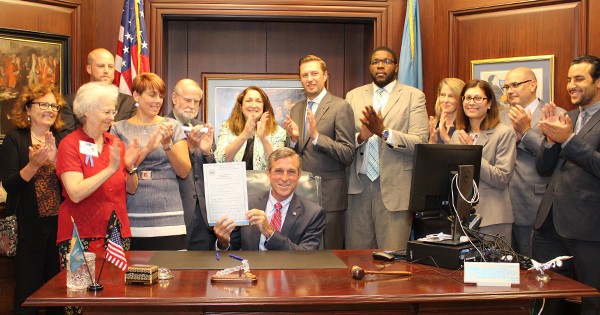School of Education
Computer science for everyone

Two UD professors watch governor sign law requiring public high schools to teach computer science
Why access matters
The law can help to level the playing field in computer science by ensuring access for everyone — something Pollock and Mouza are passionate about. Nationwide, low-income students are less likely to have access to a high school computer science course than wealthier students, and minority students are less likely to have access than white students, according to an analysis by Change the Equation, a nonprofit aimed at improving access to STEM education. By closing the access gap, and promoting computer science in general, schools can also help close the gender gap in computer science. Last year, only 18.5 percent of doctoral recipients in computer science were women, according to the Computing Research Association. “We would broaden participation and diversity if people had access to computer science courses at a much younger age,” said Pollock. Diversity in computer science is good for everyone. “There are several reasons why you want a diverse population creating software, and one is that the makers should represent the users of the software,” said Pollock. Often, jobs in computer science offer great economic opportunities — some people miss out on these opportunities because they don’t have access to computer science training early enough. The average starting salary for a 2016 UD graduate was $50,000, but those with a bachelor of science in computer science are pulling in an average of $72,500 — and a high of $120,000. “Kids form impressions about belongingness at a young age, so it’s important for them to see themselves in these positions,” said Mouza. That’s one reason she and Pollock are working to promote computer science even for kids at the elementary level.
Preparing teachers for the push
As schools look to add computer science courses, teachers may need training to prepare for the new offerings. There is no certification for computer science teachers, so often the courses are taught by math or science teachers who have an interest in computing. Mouza and Pollock are co-principal investigators, along with professors Terry Harvey and James Atlas, on a four-year $853,000 grant and a three-year $997,348 grant that focus on computer-science-related professional development for teachers. They offer a summer course, which drew 50 participants this year, and provide in-classroom support throughout the year with the assistance of UD undergraduates. For more information, click here. “We would like to create a credential, following a sequence of courses, in the near future for computer science teachers to facilitate the implementation of the bill,” said Mouza. | Photo courtesy of the Office of the Governor Read this article on UDaily.



